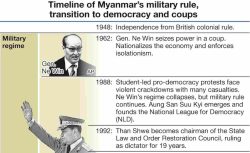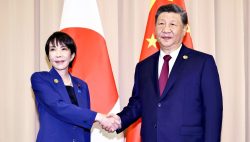WTO Ministerial Conference: Dysfunction in Dispute Settlements Having Grave Impact
14:30 JST, March 5, 2024
The dysfunction of the World Trade Organization, which is supposed to promote free trade, has once again been highlighted. To protect the free trade system, the countries concerned are urged to persistently discuss ways to resolve the situation.
The WTO held a ministerial conference from Feb. 26. Originally scheduled to last until Feb. 29, the conference was extended until Saturday. However, it concluded without notable results on major agenda items, such as reform of the trade dispute settlement system.
The WTO has over 160 member countries and regions, and holds a ministerial conference every two years to discuss trade rules and other issues.
The Ukraine crisis has led to widespread export restrictions on agricultural products, resulting in a food crisis. An increasing number of countries imposed export restrictions on medical supplies and other items during the COVID-19 pandemic. The WTO still has a major role to play, and its dysfunction cannot be left unaddressed.
Most seriously, the WTO’s dispute settlement system is barely functioning.
The WTO has a court-like system for settling disputes under WTO rules when bilateral negotiations fail to resolve an issue. It is a two-layer system in which a dispute settlement panel discusses a case and if one of the party countries is not satisfied with the panel’s decision, it can appeal to the Appellate Body for a final ruling.
However, because the United States has blocked appointments of members to the Appellate Body, the body’s hearings have been suspended since December 2019.
This is believed to stem from the United States’ strong dissatisfaction that the WTO has not been able to adequately address China’s unfair trade practices and that the Appellate Body had made decisions that back China’s claims.
At the latest ministerial conference, Japan and Europe appealed for the early restoration of the functions of the Appellate Body, but the United States reportedly did not change its opposition.
There have been a number of cases in which countries that lost their cases at panel hearings have taken advantage of the fact that Appellate Body hearings have halted, and deliberately tried to shelve their disputes by appealing to the Appellate Body.
If the WTO’s dispute settlement function continues to stall, protectionism may spread. The United States should not just block appointments but also present a concrete plan for improvement.
In the meantime, China, which joined the WTO in 2001, has been criticized for its unfair trade practices, including excessive subsidies to state-owned enterprises and the infringement of intellectual property rights. To promote reform at the WTO, it is essential that China strive to improve its trade practices.
As economic giants, the United States and China should take actions aimed at the development of global trade as a whole, rather than placing priority on only their own interests.
It is important for Japan and Europe, which share the same recognition of the need for reform at the WTO , to strive to coordinate their views while listening to the voices of emerging and developing countries as well as the United States and China.
(From The Yomiuri Shimbun, March 5, 2024)
Top Articles in Editorial & Columns
-

Myanmar Will Continue Under Military Rule Even After Election, Ex-Ambassador Maruyama Says in Exclusive Interview
-

40 Million Foreign Visitors to Japan: Urgent Measures Should Be Implemented to Tackle Overtourism
-

Expansion of New NISA: Devise Ways to Build up Household Assets
-

China Criticizes Sanae Takaichi, but China Itself Is to Blame for Worsening Relations with Japan
-

Withdrawal from International Organizations: U.S. Makes High-handed Move that Undermines Multilateral Cooperation
JN ACCESS RANKING
-

Univ. in Japan, Tokyo-Based Startup to Develop Satellite for Disaster Prevention Measures, Bears
-

JAL, ANA Cancel Flights During 3-day Holiday Weekend due to Blizzard
-

China Confirmed to Be Operating Drilling Vessel Near Japan-China Median Line
-

China Eyes Rare Earth Foothold in Malaysia to Maintain Dominance, Counter Japan, U.S.
-

Japan Institute to Use Domestic Commercial Optical Lattice Clock to Set Japan Standard Time



















